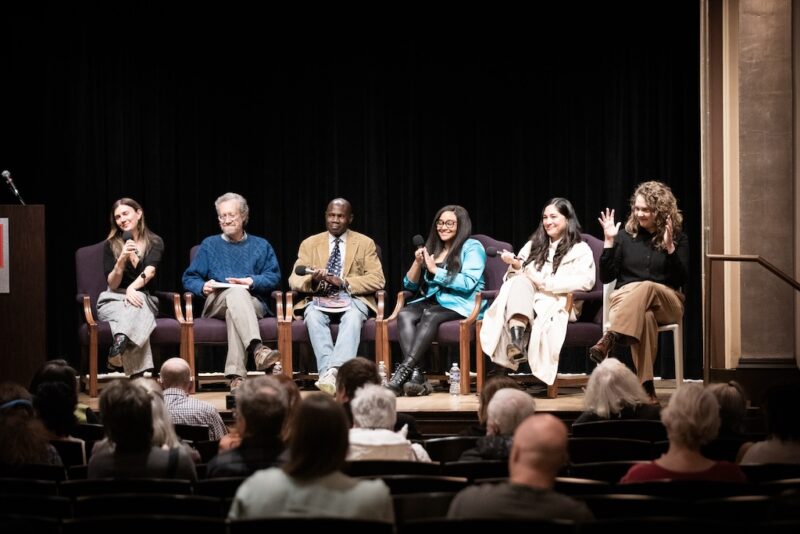A lot happened online this week, especially in music and pop culture. Highlights: Choco Tacos, an allergy to the cold, the Supreme Court, the Mississippi Delta, Wakanda Forever, RENAISSANCE, Kelis, Keke Palmer, and monkeypox.
1. Eater: The Legend of the Choco Taco
After nearly 40 years, Klondike is discontinuing its novelty ice cream, the Choco Taco. News of the announcement quickly had Twitter in dismay. The inventor of the cold treat, Alan Drazen, “claims he saw the Choco Taco in a vision” back in 1983. Since its creation, over one billion Choco Tacos have been enjoyed, according to Drazen. Yet, Klondike has cited a dip in demand for the frozen treat for its cancellation. But with all of the buzz and apparent clamoring for the novelty, some are wondering if this is a PR stunt for free publicity.
2. Outside: I Woke Up with Cold Urticaria
On a trip with her boyfriend, Alison Espach developed cold urticaria—an allergy to the cold. At first, she wasn’t sure what caused her to break out in hives. Soon, however, she found herself “[reading] about people who are allergic to the cold. To the heat. There are people who claim to be allergic to electricity, to their cell phones, to the internet. Babies who are allergic to touch.” The more Espach learned, the more she considered its connection to her “Hashimoto’s thyroid disorder [that] is somehow related to my brother’s death,” she writes. “It seems fitting that people can develop autoimmune diseases like mine after periods of intense grief, years of wondering why him and not me, what makes me so special that I get to live, all those long nights I stayed up attacking myself, dreaming of the things I should have done to save him.”
3. The Guardian: The rightwing supreme court has another target: Native American rights
The Supreme Court hears and decides on cases in a myriad of legal areas, though cases involving reproductive justice and other substantive due process rights such as same-sex marriage receive the most coverage. While the conservative court steadily chips away at those rights, they are also targeting Native American rights and sovereignty. In June, “The 5-4 decision in Oklahoma v Castro-Huerta found that state governments have the right to prosecute non-Natives for crimes committed against tribal members on reservation lands,” upending “that Indian country sat apart from states and was instead subject to congressional and federal authority” granted by the SCOTUS’s 1886 decision in United States v. Kagama.
Nick Estes, a member of the Lower Brule Sioux Tribe, discusses the legal history of Native American rights and how “State jurisdiction might seem like a trivial matter. But the very foundations of Indian law were forged in a tumultuous, and often violent, struggle between states and tribes.”
4. Slate: Alito’s Speech Mocking Foreign Leaders Has a Deeper, Darker Message
Last week, Justice Samuel Alito, who wrote the decision in Dobbs v. Jackson Women’s Health that overturned Roe v. Wade, “gave a talk in Rome sponsored by the University of Notre Dame Law School’s Religious Liberty Initiative.” In the speech, which purports to be about religious freedom, Alito mocked international criticism of the decision, and made “snarky little potshots at Prince Harry and Boris Johnson [that] were not so much ‘jokes’ about world leaders as personal petulance over international criticism, cloaked in the insistence that Alito doesn’t care what these world leaders think of him.”
Throughout the speech, write Dahlia Lithwick and Mark Joseph Stern, Alito “clearly revels in the plummeting approval ratings and the international and domestic loathing. He takes it as a sign that his religious liberty project matters: The more the godless, or as he put it, the adherents of ‘the new moral code,’ hate him, the more certain he is that he is correct.” Furthermore, “there is the breathtaking conflict of interest at work when a justice gives faith-based speeches at faith-based events sponsored by faith-based parties who file briefs before the court… As Gabe Roth of Fix the Court, a nonprofit that promotes judicial ethics reforms, noted in an email Thursday, RLI and its affiliated professors ‘have filed amicus briefs in several SCOTUS cases, and they have a near-perfect record.’”
The court is a failed institution, and “if you are not very frightened by the prospect of a Supreme Court justice crossing the ocean in order to quote the Gospels to religious adherents of his own faith, who have business before the court, as he excoriates all who do not share his personal view of the primacy of religion as an organizing force in a political democracy, it’s difficult to know what could alarm you.”
5. Hakai Magazine: The Controversial Plan to Unleash the Mississippi
I grew up in Michigan, on the Great Lakes, the opposite end of the Mississippi delta. The Chicago River used to flow into Lake Michigan, but in 1900, due to contamination concerns, it was reversed to feed into the Mississippi River, eventually making its way to the Mississippi delta and the Gulf of Mexico.
The Mississippi delta, too, has been controlled through artificial means for years. The levees used to contain the river have caused the loss of land in the delta. But now, the new, controversial Mid-Barataria Sediment Diversion plan to build a new “sub-delta” could come to pass after being discussed for years. However, the proposal has “come under a firestorm of criticism from shrimpers worried about their livelihood; from homeowners concerned about flooding; and from environmentalists dismayed at the potential loss of bottlenose dolphins, a federally protected species. The diversion is intended to build new marshland, but it’s sometimes depicted as the latest assault on the region’s rural communities—which, according to critics, are about to be sacrificed again for the sake of nearby urban New Orleans.”
6. YouTube: Marvel Studios’ Black Panther: Wakanda Forever | Official Teaser
Marvel released the teaser for Black Panther: Wakanda Forever, and everyone was in tears. Tems’ cover of Bob Marley’s “No Woman No Cry” begins a trailer that is as much a memorial for the late Chadwick Boseman—who played Prince T’Challa’s Black Panther—as it is a promotion for the movie. The trailer focuses on the women of Wakanda, “who embody our collective grief and represent experiences all too familiar in our real world, where sons, brothers, and partners become hashtags while the women who mourn them are left to fight for justice,” writes Albert Samaha, connecting the fictional story to the history of the Black Panther Party.
As the teaser continues, Tems sings “every little thing’s gonna be alright” while Queen Ramonda asks “haven’t I given everything?” Tems continues to sing, and “No Woman No Cry” gets mixed with Kendrick Lamar’s “Alright.” At the teaser’s climax, Lamar eclipses Tems, declaring that “we gon’ be alright.”
7. Beyoncé: RENAISSANCE
Beyoncé released her seventh studio album, and first in six years, RENAISSANCE on Friday, and it is all anyone is talking about. The album is full of dance music, end to end, sampling from house, bounce, and disco. The album is perfect to listen to “1am on a thurs night when the party / company / drugs / vibes are simply too good to worry about something as terrestrial as tomorrow morning.” Across Twitter, people were thrilled that Jay-Z, Beyoncé’s husband, didn’t have a verse.
8. Complex: Kelis Speaks Out About Being Sampled on Beyoncé’s ‘Renaissance’ Album
While RENAISSANCE is being lauded, controversy has also surrounded its release. Singer Kelis’s “Get Along with You” is sampled on the track “Energy.” This was news to Kelis when the writing credits for RENAISSANCE were released, as she had not previously known about the sample. “Get Along with You” is credited to Pharrell Williams and Chad Hugo as Kelis did not receive a writing credit or royalties for that song (or many others, including “Milkshake”) due to predatory practices from Williams and Hugo as she alleged in a previous interview.
Kelis learned of the sample through a fanpage lauding it as “collaboration,” however, for her it is “theft.” In her responses to the use of the song, Kelis makes it clear that she is not targeting Beyoncé, but discussing a systemic issue in music as many artists lose rights to their work through nefarious practices.
It is unclear if Beyoncé would have needed to legally clear the use of the song with Kelis, but it would have been considerate.
9. YouTube: Please let Keke Palmer have her moment.
I love Keke Palmer and she is absolutely having a moment right now. Nope, Jordan Peele’s newest film that stars Palmer, has received commercial and critical acclaim. Palmer is hilarious as a judge on Legendary. She continues to stay relevant online through memes and comedic skits. And she is just absolutely beautiful.
A viral thread by @NBAgladiator embroiled Palmer in a conversation this week about colorism when the thread compared her to Zendaya. The thread asked someone to do a deep-dive of the comparison, which is exactly what Kimberly Nicole Foster does in this video. Foster breaks down the arcs of both actors’ careers, why the assertion about colorism is basic, and Palmer’s response.
10. The Atlantic: America Should Have Been Able to Handle Monkeypox
Although we have had years to heed the warning signs of monkeypox, it feels like this week was the week people started paying attention. With more than “21,000 confirmed cases, nearly a fourth of which are in the United States,” we are experiencing “the country’s second infectious crisis in three years.” Unlike SARS-CoV-2, however, we have vaccines and treatment for the virus, and its outbreak is “confirmation that, although the U.S. might have once seemed like one of the nations best equipped to stop and prevent outbreaks, it is, in actuality, one of the best at squandering its potential instead.”
Moreover, monkeypox is being branded as a “gay disease” that only men who have sex with men can get. While monkeypox is currently primarily affecting men who have sex with men, “the virus is transferred through “Kissing, cuddling, and other situations that put bodies in close proximity for prolonged periods.” But even contact with clothing or bedding can transmit the virus, too, “because monkeypox can persist on unsanitized surfaces for days.”
Meanwhile, the COVID-19 pandemic continues. I hope y’all are still wearing your masks!






